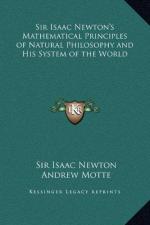|
This section contains 1,647 words (approx. 6 pages at 300 words per page) |

|
NEWTON, ISAAC (1642–1727), widely regarded as the greatest scientist of all time. Born prematurely (at Woolsthorpe, Lincolnshire, England), Newton developed into a physically weak, lonely, unhappy child; he was also an indifferent student until an encounter with a school bully roused him to excel. In 1661, he entered Trinity College at Cambridge University, where he showed no distinction until he came under the influence of Isaac Barrow, a professor of mathematics. A man of great insight, Barrow was the first to recognize Newton's genius; in fact, he resigned his professorship so that Newton, at age twenty-six, could be appointed to it.
Shortly after Newton graduated in 1665, the university was closed because of plague, and he had to return to Woolsthorpe. There he spent eighteen months in studies that laid the foundation for much of his later work. He discovered the binomial theorem, differential and integral calculus, the theory...
|
This section contains 1,647 words (approx. 6 pages at 300 words per page) |

|


